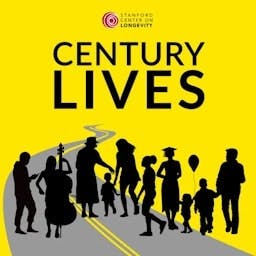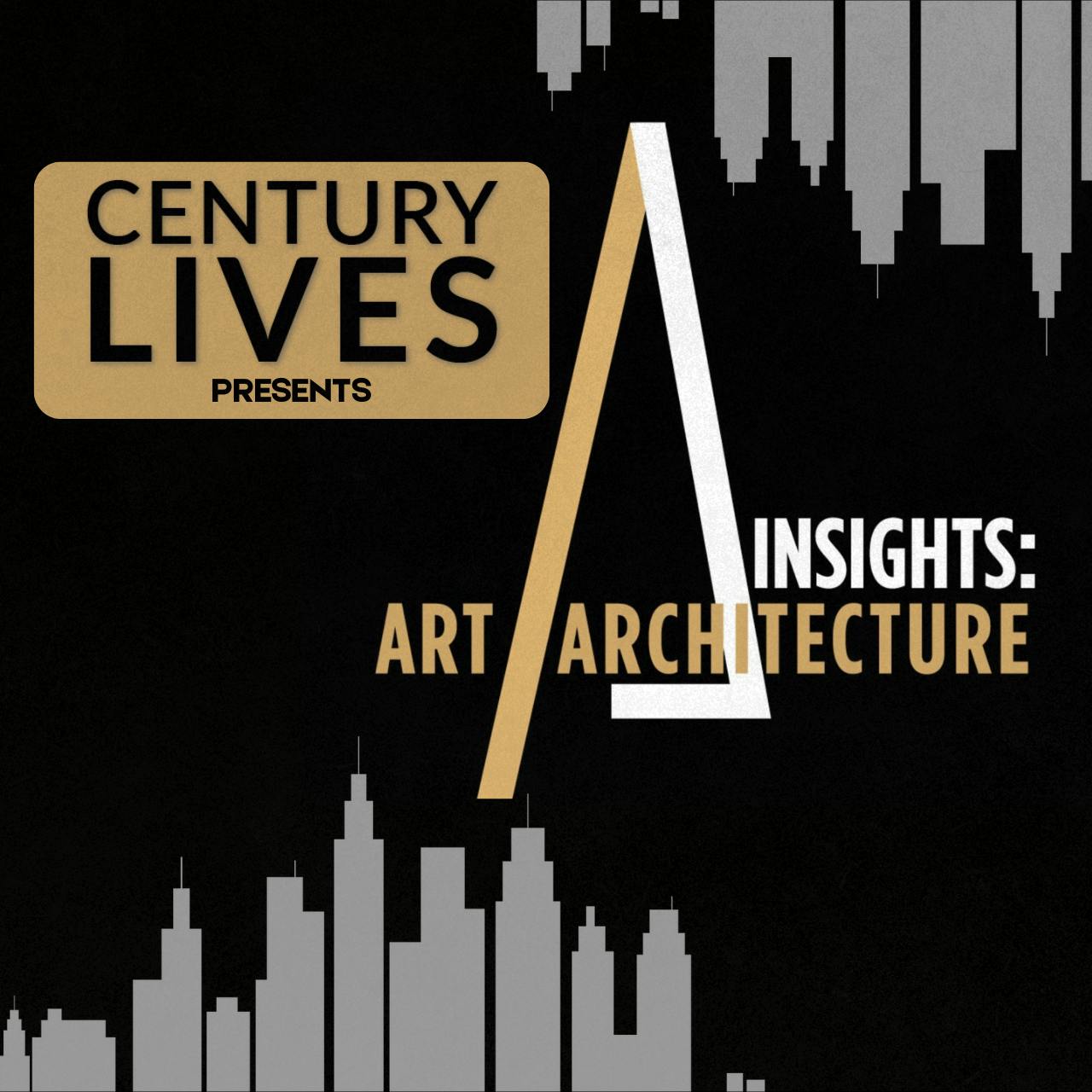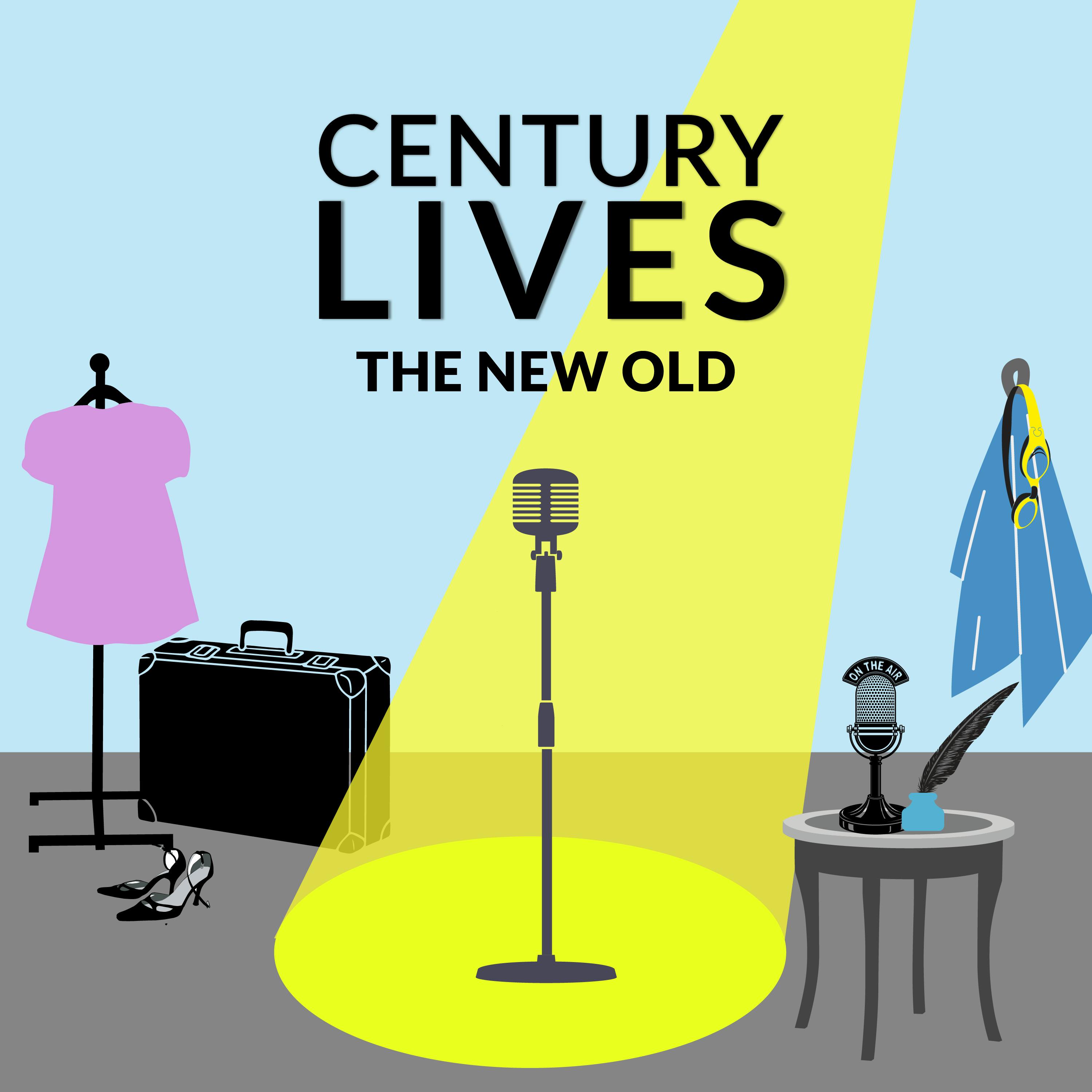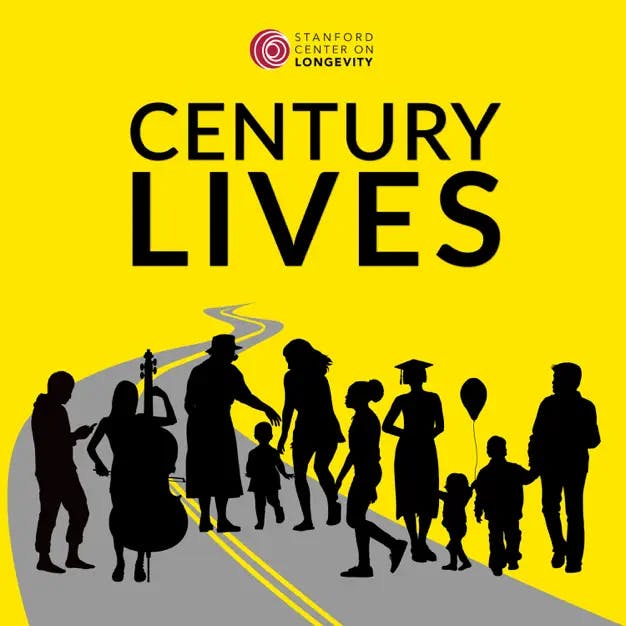Discover Century Lives
Century Lives

Century Lives
Author: Stanford Center on Longevity
Subscribed: 133,929Played: 408,470Subscribe
Share
© Stanford Center on Longevity
Description
It’s a well-known fact that women live longer than men. But less well known is the fact that women live a larger percentage of their lives in poor health than men do. In Century Lives: The 51%, we explore the failures that have contributed to women’s health disadvantage for centuries: shortcomings in healthcare, research, education, policy, and social norms alike. And we tell the stories of the visionary leaders, doctors, and innovators working to level the playing field today.
62 Episodes
Reverse
What is it about architecture that celebrates longevity?
The world’s most famous architect, Frank Gehry, was actively at work until his death at age 96, finishing his Guggenheim Museum in Abu Dhabi and still designing the greatest works of his career. Masters Frank Lloyd Wright and Phillip Johnson also worked into their 90s and were even more prolific than Gehry.
In this special series, Century Lives introduces Victoria Newhouse, a renowned architectural historian. At age 87, Victoria chats with her contemporaries: the late Frank Gehry, Rem Koolhaas, Moshe Safdie, Peter Eisenman, and Raj Rewal—all renowned architects and all in their 80s and 90s.
In episode 1 , Victoria Newhouse talks with Frank Gehry in one of the final interviews of his life. He died just a few months after this conversation, at the age of 96. Frank and Victoria had a friendship spanning more than 40 years, traveling the globe together to visit his buildings. Frank discusses his $1 billion Guggenheim Museum about to open in Abu Dhabi, and other pivotal moments in his extraordinary career.
Look around you: Our communities are filled with people in their 60s, 70s, 80s, even 90s, doing things that would have been unthinkable at their age a generation ago. By 2030, the entire Baby Boomer generation will be 65 and older. By mid-century, more than 80 million Americans will be over the age of 65. By any prevailing definition, the United States will be a country full of older adults. But what does it mean to be old in an era of much longer life?
Welcome to Century Lives: The New Old, from the Stanford Center on Longevity! I’m your host, Ken Stern. In this season, we interview six extraordinary people who are challenging the way we think about aging—and inspiring new ways we can live our supersized lives.
Today: Margaret Cho. She is a Korean-American comedian, actress, musician, advocate, and entrepreneur. Most of us know her from her stand-up, where she pokes fun at topics like race, sexuality, body positivity, and politics. Decades after her network debut, she’s still using comedy as activism.
Look around you: Our communities are filled with people in their 60s, 70s, 80s, even 90s, doing things that would have been unthinkable at their age a generation ago. By 2030, the entire Baby Boomer generation will be 65 and older. By mid-century, more than 80 million Americans will be over the age of 65. By any prevailing definition, the United States will be a country full of older adults. But what does it mean to be old in an era of much longer life?
Welcome to Century Lives: The New Old, from the Stanford Center on Longevity! I’m your host, Ken Stern. In this season, we interview six extraordinary people who are challenging the way we think about aging—and inspiring new ways we can live our supersized lives.Today: Billy Collins. He is one of America’s best-known poets, whose poems are beloved for their conversational and accessible style and for their humor. Billy Collins was the Poet Laureate of the United States for two terms, from 2001-2003. He talks here about his new collection of poems about dogs, and about a lifetime of observing the world around him and finding the right words to describe it. He also discusses mortality, which he says is one of poetry’s most common topics. And he reads several of his poems for us!
Look around you: Our communities are filled with people in their 60s, 70s, 80s, even 90s, doing things that would have been unthinkable at their age a generation ago. By 2030, the entire Baby Boomer generation will be 65 and older. By mid-century, more than 80 million Americans will be over the age of 65. By any prevailing definition, the United States will be a country full of older adults. But what does it mean to be old in an era of much longer life?
Welcome to Century Lives: The New Old, from the Stanford Center on Longevity! I’m your host, Ken Stern. In this season, we interview six extraordinary people who are challenging the way we think about aging—and inspiring new ways we can live our supersized lives.
Today: Diana Nyad. Her name is synonymous with courage, endurance, and the relentless pursuit of possibility. From Diana's record-breaking swim from Cuba to Florida at age 64, to her trailblazing career as a journalist and motivational speaker, to her latest passion authoring children’s books, Nyad continually redefines what it means to test one’s limits. She shares her story as a woman whose perseverance has inspired millions to “never, ever give up.”
Look around you: Our communities are filled with people in their 60s, 70s, 80s, even 90s, doing things that would have been unthinkable at their age a generation ago. By 2030, the entire Baby Boomer generation will be 65 and older. But what does it mean to be old in an era of much longer life?
Welcome to Century Lives: The New Old, from the Stanford Center on Longevity. In this season, we interview six extraordinary people who are challenging the way we think about aging.
Today: Nina Totenberg. Her voice is one of the most famous in broadcasting. Nina Totenberg is the legal affairs correspondent at NPR, a job she’s held since 1975. She talks here about why she continues to work into her 80s, with no plans to retire. And she regales us with stories about her early career, when there were few women journalists. She also discusses some of her most famous reporting, including her breaking news story about Anita Hill’s accusations against then-nominee to the Supreme Court, Clarence Thomas.
Look around you: Our communities are filled with people in their 60s, 70s, 80s, even 90s, doing things that would have been unthinkable at their age a generation ago. By 2030, the entire Baby Boomer generation will be 65 and older. But what does it mean to be old in an era of much longer life?
Welcome to Century Lives: The New Old, from the Stanford Center on Longevity. In this season, we interview six extraordinary people who are challenging the way we think about aging.
Today: Jacynth Bassett. She is one of the leading anti-ageism activists in the world, and yet she is only in her early 30s (and has already been fighting ageism for a decade). Jacynth Bassett is the founder and CEO of a campaign and a global community called “Age-ism is Never in Style”. She is also the founder and CEO of a women’s fashion brand called “Bias Cut” that proudly, loudly declares itself an “age-inclusive” brand. She tells the story of how she chose this cause, and explains that ageism can affect the young as well as the old, and is the one form of discrimination we will all experience. She also discusses the ways that ageism can damage our health and the economy.
Look around you: Our communities are filled with people in their 60s, 70s, 80s, even 90s, doing things that would have been unthinkable at their age a generation ago. By 2030, the entire Baby Boomer generation will be 65 and older. But what does it mean to be old in an era of much longer life?
Welcome to Century Lives: The New Old, from the Stanford Center on Longevity. In this season, we interview six extraordinary people who are challenging the way we think about aging.
Today: Rick Steves. In 1978, he was a piano teacher with a touch of wanderlust. Two months traveling overland from Istanbul to Kathmandu changed that. The trip ultimately made him what he is today: a storyteller, a critical source of information about travel in Europe, and our country’s foremost cheerleader for the value of travel. For the past half century, Rick Steves has taught his fellow Americans how to travel better, through his guidebooks, radio program, app, TV series, and bus tours. He recently turned 70, and many of his globetrotting followers are now older adults, too. We’re here to talk with Rick Steves about how he has reinvented himself—and his industry—as he ages.
Look around you: Our communities are filled with people in their 60s, 70s, 80s, even 90s, doing things that would have been unthinkable at their age a generation ago. By 2030, the entire Baby Boomer generation will be 65 and older. But what does it mean to be old in an era of much longer life?
Welcome to Century Lives: The New Old, from the Stanford Center on Longevity. In this season, we interview six extraordinary people who are challenging the way we think about aging.
Today: Fran Drescher. You might know her as Fran Fine, the star of the hit 1990s TV show The Nanny. After a bout with uterine cancer in her early 40s, she started Cancer Schmancer: a non-profit focused on prevention, early detection, and policy change. More recently, she took on a new role: President of SAG-AFTRA, the union she’s been a member of for decades. Fran Drescher is now 67. She’s here to talk to us about how she has reinvented herself—and her industry—as she ages.
A future season of Century Lives will take a deep dive into the subject of housing. Our focus is inspired by a striking fact: The US is already facing a major shortfall of housing suitable for seniors, and the number of Americans over 65 is expected to grow by 30 million by mid-century. So… we want to hear from you! Please share your concerns and questions, whether it’s about:
Cost
Aging in place
Finding community
Moving
Arranging care
Navigating family
... or anything else related to housing as you age. We may use your question on the final episode of our upcoming season.
Please call and leave us a message telling us what’s on your mind at (412) 467-6356. You can also email us at housing.century.lives@outlook.com. We may be able to use your question on the podcast. Make sure to include your name, age, phone number and a brief description of your circumstances.
Ken Stern, the host of “Century Lives”, will be joined by special guest Ryan Frederick, a renowned author, expert on the intersection of health, longevity and place—and a leading voice in the emerging field of place planning, which helps people make more intentional decisions about where to live for each stage of life.
Thanks, and we look forward to hearing from you!
Sometimes a single question can open up a whole new world. About ten years ago, a young doctor named Sara Naseri was trying to think of how the field of medicine could be more preventative. It was so difficult to get information about what was going on inside people’s bodies, before they were sick enough to go to a doctor for a blood draw. Suddenly it dawned on her: Women bleed every month. What can we learn from that blood, and why has no one looked at it before? A rigorous scientific study followed—and eventually, a Silicon Valley start-up called Qvin, which produces menstrual pads used for testing women’s blood. Dr. Naseri represents a new generation of women coming up with innovations to close the women’s health gap. We travel to Silicon Valley to meet her, and we talk to two venture capitalists about the impact women in venture are having on private sector efforts to improve women’s health.
Two of the biggest social factors that contribute to health problems are financial insecurity and caregiving for family members. And it’s no coincidence that the burden of both falls more heavily on women. We hear the moving story of a woman named Amy Goyer, whose responsibilities as a caregiver landed her in bankruptcy and prevented her from taking care of her own health. She is now the national caregiving expert for the AARP. We also talk to three experts about how women’s lower financial status leads to health problems, how health problems lead to lower financial status, and how both are tied to women’s roles as caregivers: Chloe Bird, Director of the Center for Health Equity Research at Tufts Medicine, Ana Hernandez Kent of the Federal Reserve and Heather McCulloch of the Aspen Institute Financial Security Program.
What are autoimmune diseases, exactly? And how many people have them? Experts can’t quite agree on the precise number, but it’s a lot: somewhere between 10 and 15% of the population. And 80% of those people are women. Autoimmune diseases contribute significantly to a lower quality of life, and incidences of autoimmune diseases are dramatically increasing. Autoimmune diseases have typically been under-researched and, as a consequence, are poorly understood. But thanks to new funding and research, efforts are underway to gain new insights into this category of diseases that affect millions of women.
Everyone knows that heart disease is a men’s issue. But as it turns out, everyone is wrong. Heart disease is also the leading killer of women. And despite significant efforts to educate the public about women’s heart disease, the risks that women face are still badly understood—not just by the public, but by the medical community, too. Why are doctors still ill-prepared to treat women with heart disease? And why do so many women not realize the threat of cardiovascular disease to their own health?
There are very few givens when it comes to menopause - and mostly unanswered questions. Should you treat menopause with hormones? Do hormones cause breast cancer? Do hormones cause heart disease? What about non-hormonal alternatives? Shouldn’t you just stop complaining? In this episode, we’ll offer a few answers about how we got here - decades after the abrupt end of the Women’s Health Initiative, the first study of its kind to look at the effects of hormone therapy on women’s health. We’ll hear from Dr. Marcia Stefanick who worked on the original WHI study and meet Dr. Joann Pinkerton and Dr. Wen Shen, who have devoted their careers to improving women's lives at midlife.
During its first hundred years, the National Institutes of Health, the world’s premiere medical research institution, used only male subjects in its clinical studies, completely ignoring the anatomy and physiology of half of humankind. But that began to change in 1990 - a turning point for women’s health in the United States, one brought about by the growing power of women in Congress and the field of medicine. We talk with Senator Barbara Mikulski, who along with a small band of members of Congress, demanded change at NIH, and Dr. Vivian Pinn, a trailblazing pathologist who became the first head of the Office of Research on Women’s Health at NIH.
The United States has been described as the “most age-segregated society that’s ever been." In the final episode of Century Lives: The Century Club, Ken travels around the globe to explore how other societies make intergenerational connections. He gets serenaded by the oldest and youngest Spaniards and witnesses the world’s most comprehensive effort to build an intergenerational society in Singapore. And as Ken wraps up his trip, he realizes that he found his ikigai.
It may not come as a surprise, but fixating on someone’s age can affect how you think about them—and even how they think about themselves. And the health implications are dramatic. People who have a negative view of aging live on average 7.5 fewer years than those who have a more positive view, even holding constant for other health and social factors.
In this episode, Ken travels to some of the longest-lived countries in the world to find societies that put real thought into the needs of older adults. We'll see a fashion show in Singapore, go to a beauty school in Japan, and meet a street photographer in South Korea to discover a kind of longevity advantage that stems from cultures that encourage a positive attitude towards aging.
It’s been said that you are what you eat, and Italians are aging like the fine wine that makes them famous. As older Italians retire and leave their careers behind, an astonishing number of them are beginning new chapters as volunteers. In this episode, Ken travels across Northern Italy to explore its vibrant new culture of volunteerism. Along his journey, he gets the best advice about aging he’s ever heard.
The national motto in South Korea is “hurry, hurry,” and that’s what the country did as it turned its metropolitan areas into “lifelong learning cities.” Across the nation, adults of all ages now have access to free classes that help them keep learning—and connecting to each other. In this episode, Ken goes back to school, where he learns about the traditional art of teamaking, and meets a recent college graduate who is older than he is. Then we return to the United States to hear from an American who attributes her long lifespan—99 years and counting!—to lifelong learning.
You can’t go anywhere in Japan without running into older workers. They might be driving your taxi, serving your food, or selling you tickets at a tourist attraction. Japan has the highest percentage of older workers in the world. You might think this has to do with economic necessity and changes in pension rules. But when you look closely, you’ll discover the widely accepted belief in Japan that work brings you “Ikigai," which translates to a purpose in life that is critical to healthy and successful aging.
In Episode 2 of Century Lives: The Century Club, host Ken Stern travels to Fukuoka, Tokyo, Ukiha, and Toyama to meet older workers who describe what they enjoy about working longer. And, he visits a company in Tokyo that is developing new adaptive technologies that will help people work into their 70s and 80s—that is, if they so choose.

























Loneliness has been increasingly recognized as a serious public health issue, with effects comparable to smoking or obesity. The episode you’re referring to, Alone Again—Unnaturally, is part of the Century Lives podcast hosted by Ken Stern. It explores the profound health consequences of loneliness and how social isolation can lead to inflammation, heart disease, stroke, and type 2 diabetes https://www.smartsquarehmhn.com
The rise of edge computing will also accelerate data processing, while virtual and augmented reality will transform industries like gaming and healthcare. https://truesides.com/ covers these trends and more, keeping readers informed about the evolving tech landscape.
$100 Registration Bonus Eksklusibo sa jet!
Maging Miyembro ng daddy at Makatanggap ng $100 Agad!
Magsimula sa fresh: Makakuha ng $100 Welcome Bonus!
Magsimula sa fresh: Makakuha ng $100 Welcome Bonus!
sherbet Registration Bonus: Libreng $100 Para sa Mga Bagong User!
Magparehistro sa supernova at Makakuha ng $100 Bonus Kaagad!
Magparehistro sa supernova at Makakuha ng $100 Bonus Kaagad!
Sumali sa jazz Ngayon at Kumuha ng $100 Welcome Bonus!
Sumali sa jazz Ngayon at Kumuha ng $100 Welcome Bonus!
Simulan ang Iyong Paglalaro sa 500 casino na may Libreng $100 Bonus!
$100 Bonus Agad Para sa Mga Bagong User ng highway!
Bagong User? Sumali sa sol at Makatanggap ng $100 Bonus!
Makakuha ng $100 Bonus Kapag Nagparehistro sa exclusive Ngayon!
Para sacar na token casino - https://casinoonline-br.com/token-casino/, você precisa fornecer dados bancários e uma foto de um documento de identidade para validação. O processo de saque é rápido e seguro, e a plataforma garante que todas as suas transações financeiras sejam protegidas por tecnologia de criptografia.
Ao solicitar um saque na 777luc bet - https://casinoonline-br.com/777luc-bet/, você precisará enviar dados bancários, além de uma cópia do seu documento de identidade. A plataforma é altamente segura e garante que todos os fundos sejam protegidos, utilizando criptografia para prevenir qualquer tipo de fraude ou roubo de dados.
A br89 bet - https://casinoonline-br.com/br89-bet/ garante a segurança dos seus saques exigindo que os usuários enviem dados como informações bancárias e um documento com foto. Todos os dados são protegidos por criptografia avançada, assegurando que seus fundos sejam transferidos de maneira rápida e sem riscos.
Retirement today is more dynamic than ever, shaped by longer lifespans, evolving careers, and financial challenges. Season 5 of Century Lives offers a compelling look at this new era through the diverse experiences of Harris Health employees. From nurses to CEOs, their stories highlight the unique ways people are planning their futures. For insights into public records and criminal data in New Jersey, explore our https://arrests-nj.org resource.
I'm just amazed at how certain medical personnel can seem so endearing and thoughtful,and at the same time be aware of the deceptive nature of the so-called co-vid 19 epidemic as well as other viruses,health ailments etc?